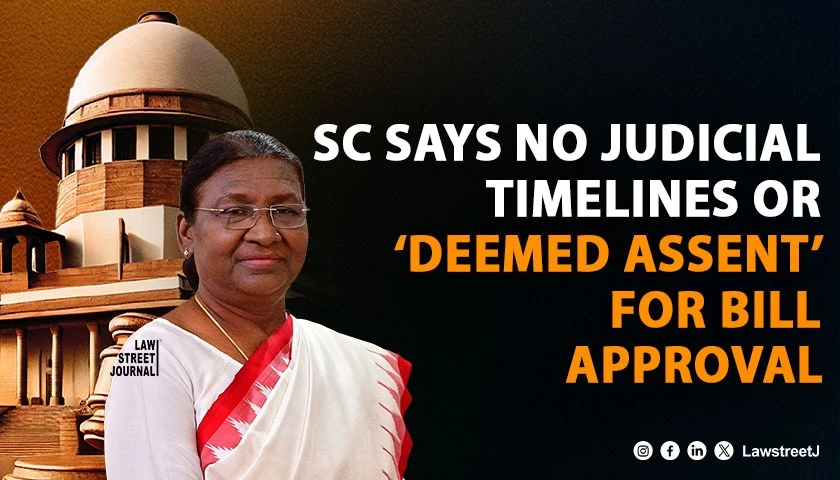New Delhi: The Supreme Court, in a significant Constitution Bench ruling delivered on Thursday, held that courts cannot mandate fixed timelines for the President or Governors to act on Bills passed by State legislatures.
The unanimous judgment, arising from a Presidential Reference made by President Droupadi Murmu under Article 143(1), clarified that judicially prescribing deadlines under Articles 200 and 201 is unconstitutional and incompatible with the scheme of the Constitution.
A five-judge Bench comprising Chief Justice B.R. Gavai and Justices Surya Kant, Vikram Nath, P.S. Narasimha, and A.S. Chandurkar rejected the idea that constitutional courts can impose strict time frames on these authorities. The Court noted that the framers intentionally left elasticity in Articles 200 and 201, recognizing the varied political, federal, and legislative contexts in which Governors and the President must exercise their constitutional responsibilities. The Court also stressed that importing rigid timelines would run contrary to this flexibility and amount to a judicial rewriting of the Constitution.
The Bench also categorically rejected the concept of “deemed assent.” It held that courts cannot declare that a Bill has received assent merely because a Governor has not acted within a perceived reasonable period.
The Court observed that the earlier use of Article 142 by a two-judge Bench in the Tamil Nadu case to grant deemed assent to ten Bills amounted to an impermissible assumption of executive power by the judiciary. Such judicial substitution, the Court held, is antithetical to the doctrine of separation of powers and would amount to a takeover of executive functions through judicial direction.
At the same time, the Court clarified that Governors cannot indefinitely delay their decisions. While courts cannot prescribe time limits, they may examine prolonged, unexplained, or deliberate inaction that frustrates the legislative process. The Court also affirmed that a constitutional court may issue a limited mandamus directing the Governor to decide the Bill within a reasonable period, but without dictating the outcome or interfering with discretionary choices such as returning the Bill for reconsideration or reserving it for the President. The Bench characterised the process as one grounded in cooperative federalism, emphasising that Governors must engage constructively with the legislature and not adopt an obstructionist approach.
The Reference arose after the Court’s April 8 judgment in State of Tamil Nadu v. Governor, where a two-judge Bench had fixed a one-month timeline for Governors under Article 200, a three-month period for Presidential decision under Article 201, and had conferred deemed assent on ten Bills.
The Constitution Bench expressly overruled those directions, holding that neither the President nor the Governor is subject to such judicially crafted deadlines. The Court further clarified that the President, when acting under Article 201, is not required to seek Supreme Court advice each time a Bill is reserved. Decisions under Articles 200 and 201 are not justiciable before a law is enacted, and challenges can arise only after a Bill becomes a statute.
Case Title: In Re: Assent, Withholding or Reservation of Bills by the Governor and the President of India
Case Number: Special Reference Case No. 1 of 2025













